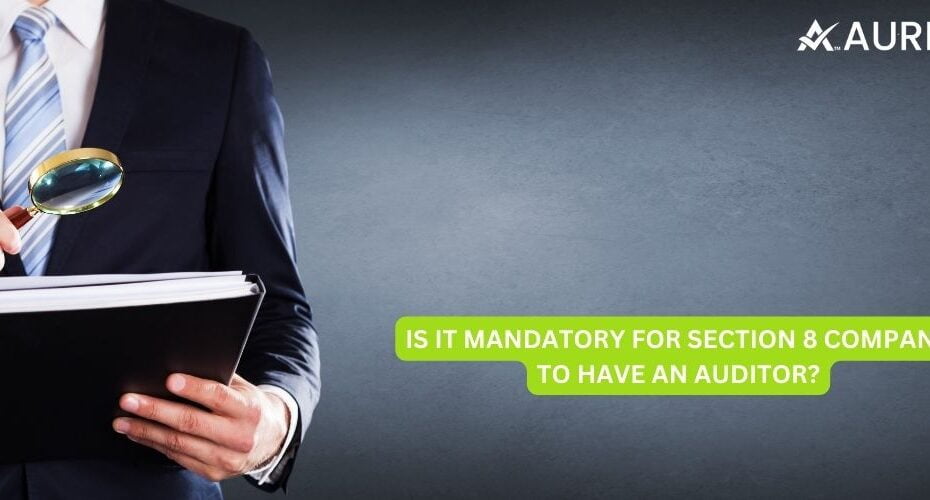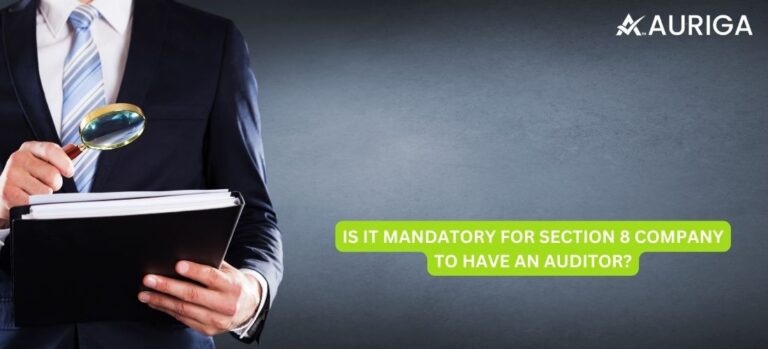
IS IT MANDATORY FOR SECTION 8 COMPANY TO HAVE AN AUDITOR?
Introduction
ToggleYOU NEED TO KNOW IS IT MANDATORY FOR SECTION 8 COMPANY TO HAVE AN AUDITOR?
Section 8 companies, also known as not-for-profit companies, are a unique form of corporate entities in India. They are established with the primary objective of promoting commerce, art, science, sports, education, research, social welfare, religion, charity, protection of the environment, or any other useful public purpose. Unlike other companies, the profits generated by Section 8 companies are not distributed among the members but are reinvested in achieving their stated objectives.
These companies play a pivotal role in driving positive social change and addressing various social and economic challenges. They encompass a wide array of entities, including charitable organizations, educational institutions, research foundations, and NGOs (Non-Governmental Organizations).Visitofficialwebsite
AUDITOR ROLE IN CORPORATE GOVERNANCE
Auditors serve a critical function in the corporate governance of all companies, including Section 8 companies. They are independent professionals responsible for examining and verifying the financial statements and accounts of a company. The primary objective of the audit is to express an opinion on whether the financial statements present a true and fair view of the company’s financial position.
The role of auditors extends beyond mere financial statement scrutiny. Auditors assess the internal control systems, governance practices, and compliance with accounting standards and legal requirements. They play a pivotal role in upholding transparency, accountability, and the integrity of the financial reporting process.
For Section 8 companies, which often handle funds and resources dedicated to social welfare and public good, the auditor’s role becomes even more critical. It ensures that the resources are utilized for their intended purpose and that there is no misappropriation or misuse of funds.
APPOINTMENT OF THE FIRST AUDITOR
When a Section 8 company is incorporated, the appointment of the first auditor is a crucial step. The key points regarding the appointment of the first auditor include:
Timeframe: The Board of Directors must appoint the first auditor within 30 days from the date of the company’s registration. The auditor is appointed to hold office until the first annual general meeting (AGM).
Member Ratification: The appointment of the first auditor is subject to ratification by the members at the first AGM. This ensures that the members have a say in the selection of the auditor.
Independence: The first auditor must be an independent professional who does not have any financial or personal interest in the company. This is critical to ensure objectivity and impartiality in the audit process.
The first auditor plays a pivotal role in setting the stage for the subsequent audit process. Their initial appointment establishes the foundation for ongoing audit practices and standards within the company.
What is the penalty for non compliance for Section 8 company
the penalties for non-compliance by Section 8 companies in India are stipulated under the Companies Act, 2013. However, specific penalties can vary based on the nature and extent of non-compliance. Section 8 companies are formed for charitable or not-for-profit purposes, and adherence to regulatory requirements is crucial for maintaining their status.
Common areas of non-compliance and associated penalties may include:
Failure to Hold Annual General Meeting (AGM): Section 8 companies are required to hold AGMs within six months from the end of the financial year. Non-compliance may lead to penalties on the company and its officers.
Failure to File Annual Returns: Section 8 companies must file annual returns with the Registrar of Companies (RoC). Failure to do so within the prescribed time may result in fines for the company and its officers.
Non-compliance with Audit Requirements: Section 8 companies are required to appoint auditors and conduct audits of their financial statements. Failure to comply with auditing requirements may lead to penalties.
Misuse of Funds: Section 8 companies are expected to use their funds only for charitable purposes. Any misuse or diversion of funds for personal gain or non-charitable activities may result in penalties and legal consequences.
Failure to Maintain Books of Accounts: Non-compliance with the requirement to maintain proper books of accounts may lead to penalties.
Non-compliance with Regulatory Changes: Section 8 companies must stay updated on regulatory changes. Failure to comply with new provisions or amendments in the Companies Act may result in penalties.
Penalties can include fines imposed on the company and its officers, and in severe cases, the Registrar of Companies may take legal action, which could lead to the dissolution of the Section 8 company. It’s essential for Section 8 companies to engage with legal professionals and company secretaries to ensure ongoing compliance with regulatory requirements and avoid potential penalties. Keep in mind that legal provisions may have been updated, so it’s advisable to check the latest amendments to the Companies Act or consult legal experts for the most current information.
Can Section 8 company issue shares
Section 8 companies in India, formed for charitable or not-for-profit purposes, have certain restrictions regarding the issuance of shares. Here are key points related to the issuance of shares by Section 8 companies:
Dividend Restrictions: Section 8 companies are generally prohibited from distributing dividends to their members. Since the issuance of shares is closely associated with the potential distribution of dividends, Section 8 companies are not allowed to issue shares with dividend rights.
Focus on Charitable Objectives: The primary purpose of Section 8 companies is to promote charitable activities, and their income and property are expected to be utilized for the advancement of these objectives.
Debentures and Bonds: While Section 8 companies may not issue shares for equity participation, they are permitted to issue debentures or bonds as a means of raising funds. The funds raised through these debt instruments can be utilized for the charitable purposes specified in the company’s memorandum of association.
Central Government Approval: Any proposed alteration to the memorandum of association or articles of association, including changes related to the issuance of shares or debentures, requires the approval of the central government. Section 8 companies need to apply to the government, providing reasons for the proposed alteration, and obtain its approval before implementing any changes.
Compliance with Regulatory Changes: Regulations and legal provisions may be subject to updates and amendments. Section 8 companies should stay informed about the latest changes in the Companies Act or other relevant legislation to ensure compliance with the most recent requirements.
It’s important to note that legal provisions can evolve, so it is advisable to consult legal professionals or company secretaries to ensure accurate and up-to-date information regarding the ability of Section 8 companies to issue shares.

APPOINTMENT AND REAPPOINTMENT OF AUDITOR
Annual Appointment: Section 8 companies appoint auditors annually at the AGM. The auditor’s tenure is typically for one year.
Ratification: The members ratify the appointment of auditors at each AGM. Even if an auditor has served in the previous year, their reappointment must be ratified by the members.
Retiring Auditors: Auditors who have completed their term or choose not to seek reappointment are referred to as retiring auditors.
Eligibility for Reappointment: Auditors can be reappointed for subsequent terms if they are eligible and willing to continue. However, this reappointment is subject to member ratification.
Rotation of Auditors: The Companies Act also mandates the rotation of auditors after a specified tenure to ensure independence and prevent long-term association.
The annual appointment and reappointment of auditors ensure that the audit process remains current and that the members have the opportunity to assess the auditor’s performance regularly.
ELIGIBILITY AND QUALIFICATION OF AUDITOR
For Section 8 companies, as for all companies, the eligibility and qualifications of auditors are defined by the Companies Act. The key eligibility and qualification criteria include:
Chartered Accountant: The auditor of a Section 8 company must be a practicing (CA) Chartered Accountant
within the meaning of the Chartered Accountants Act, 1949. This qualification ensures that the auditor possesses the necessary expertise in financial accounting and auditing.
Independence: The auditor must be independent and should not have any financial or personal interest that could compromise their ability to provide an unbiased opinion on the company’s financial statements.
No Other Associations: The auditor should not have any other financial or official association with the company, such as being an employee or director. This is to maintain independence and avoid conflicts of interest.
Rotation: The Companies Act also prescribes the rotation of auditors after a specified term to ensure that the same auditor
Who is the first auditor of Section 8 company
The first auditor of a Section 8 company in India is typically appointed by the company’s Board of Directors within 30 days of its incorporation. The Board selects a qualified Chartered Accountant or a firm of Chartered Accountants as the first auditor. The appointed auditor then holds office until the conclusion of the first annual general meeting of the company. Subsequently, the members (shareholders) of the Section 8 company have the authority to appoint auditors at each annual general meeting. The first auditor’s role is crucial in ensuring the initial financial integrity and compliance of the newly formed Section 8 company.
What are the restrictions on Section 8 companies
No Conversion to a Profit-Making Company: A Section 8 company cannot be converted into a profit-making company. 3. Prohibition on Alteration of Objectives: The objectives of a Section 8 company cannot be altered without the prior approval of the Central Government.
Does every company have to have an auditor
many jurisdictions, companies are generally required to appoint auditors to examine and report on their financial statements. The necessity of an auditor often depends on factors like the size, nature, and legal structure of the company. Public companies and those exceeding certain financial thresholds are typically mandated to undergo statutory audits. However, smaller private companies may be exempt in some jurisdictions. While auditing is a common practice to ensure financial transparency and regulatory compliance, specific requirements can vary, so it’s important to consult local laws and regulations to determine the obligations for a particular company.
Is audit mandatory for Section 8 companies
Section 8 companies in India, which are formed for charitable or not-for-profit purposes, are required to undergo annual audits as mandated by the Companies Act, 2013. Audits ensure transparency and compliance with legal and financial regulations. The audit includes examining the company’s financial records, statements, and adherence to statutory requirements. However, regulations may change, so it’s crucial to check the latest amendments to the Companies Act or consult with a legal professional for the most current information on Section 8 company compliance requirements.
HOW AURIGA ACCOUNTING HELP YOU TO APPOINTMENT AUDITOR
Understanding Regulatory Requirements: Auriga Accounting has in-depth knowledge of the regulatory framework governing Section 8 companies and the Companies Act, 2013. They can help you understand the specific requirements and timelines for appointing auditors, ensuring compliance with the law.
Auditor Eligibility and Qualification: Auriga Accounting can guide you in selecting auditors who meet the eligibility and qualification criteria as specified in the Companies Act. This ensures that the appointed auditors are Chartered Accountants with the requisite expertise and independence.
Auditor Independence: To maintain auditor independence, Auriga Accounting can assist in ensuring that the selected auditors have no financial or personal interests that might compromise their objectivity. They can help you assess potential conflicts of interest and select auditors with a clean record of independence.
Auditor Rotation and Tenure: The Companies Act mandates the rotation of auditors after a specified tenure to prevent long-term associations. Auriga Accounting can provide guidance on auditor rotation, helping you choose auditors who have not exceeded their prescribed tenure.
First Auditor Appointment: Auriga Accounting can help you with the appointment of the first auditor, a critical step in the incorporation of a Section 8 company. They can ensure that the first auditor is selected within the stipulated timeframe and complies with all legal requirements.
Member Ratification: The appointment and reappointment of auditors in Section 8 companies are subject to member ratification. Auriga Accounting can guide you through the process of obtaining member approval, including preparing the necessary documentation and conducting the ratification process at the annual general meeting.
Audit Planning and Execution: Once auditors are appointed, Auriga Accounting can assist in the audit planning and execution process. They can collaborate with auditors to ensure a thorough and independent audit of the company’s financial statements and accounts.
Audit Reporting: Auriga Accounting can help you understand the audit reports provided by the auditors, ensuring that you have a clear understanding of the audit findings and recommendations. This facilitates transparency and accountability.
Compliance Monitoring: Auriga Accounting can provide ongoing support in monitoring compliance with audit-related requirements. They can assist in preparing the necessary documentation and records required for audit and regulatory compliance.
Advisory Services: Beyond compliance, Auriga Accounting can offer advisory services to Section 8 companies, helping them improve financial management, internal controls, and governance practices. This proactive approach ensures that the company maintains high standards of financial transparency.













